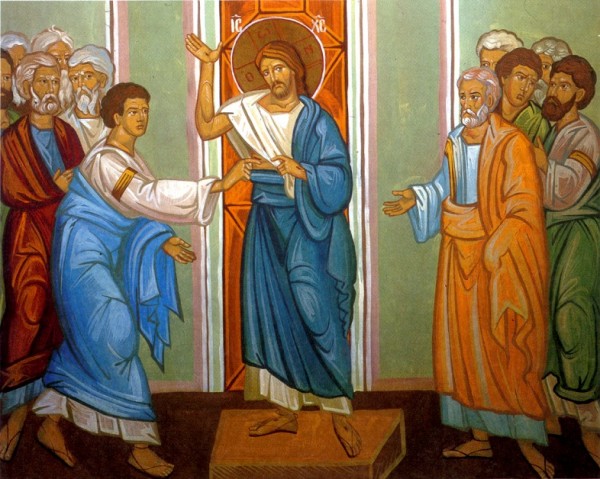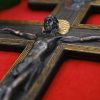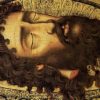Christ is Risen!
Today we continue to celebrate the most fundamental and joyful proclamation of our faith: Christ is risen from the dead, trampling down death by death, and upon those in the tombs bestowing life! He is our Pascha, our Passover, from death to life, for Hades and the grave could not contain the God-Man Who shares with us His victory over death. He has illumined even the dark night of the tomb with the brilliant light of heavenly glory. As Christ said to Martha before He raised Lazarus, “I am the resurrection, and the life: he who believes in me, though he die, yet shall he live.” (John 11:25)
When the Savior rose from the dead, He did so as a whole person with a glorified body which still bore the wounds of His crucifixion. He was born, lived, and died with a human body just like ours. Thomas doubted the news of the resurrection because he was not present when the Risen Lord first appeared to the disciples and said that he would not believe unless he saw and touched His wounds. When Christ appeared again eight days later, He told Thomas to do precisely that. Thomas responded by recognizing Him as “My Lord and my God!”
This encounter demonstrates the profound importance of Christ’s bodily resurrection for the Christian faith. Simply put, there would be no Christianity without it. The Savior obviously died on the Cross, as Roman centurions were professional executioners who knew their trade all too well. The disciples fled in fear at the Lord’s arrest with Peter denying Him three times; they had no expectation at all for His resurrection. They had wanted a military Messiah to crush the Romans and establish an earthly kingdom, not One Who was crucified by their Gentile oppressors. Inventing a story about the resurrection of a Savior for Whom they would ultimately give their own lives was the very last thing they would have done. The women demonstrated great love and courage by going to the tomb in order to anoint Christ’s dead body, which showed that they did not anticipate His resurrection either.
St. Paul taught, “[I]f Christ has not been raised, our preaching is worthless, and so is your faith.” (1 Cor. 15:14) The Savior proclaimed His divinity by forgiving sins and saying that He and the Father are one (John 10:30) and that “before Abraham was, I am.” (John 8:58) The high priest asked Him at His arrest, “Are you the Messiah, the Son of the Blessed One?” Christ responded, “I am. And you will see the Son of Man sitting at the right hand of the Mighty One and coming on the clouds of heaven.” (Mark 14: 61-62) If One Who had claimed to be God was wrong in predicting His resurrection and had simply decayed in the tomb like anyone else, there would be no Church and no reason for anyone to remember Jesus Christ today as anything but a failed Messiah with grandiose delusions.
Orthodox Christian faith is not grounded in sentimental memories about someone who lived a long time ago, but in the proclamation that “Christ is Risen!” in victory over death as a whole Person. His bodily resurrection is our hope for “the resurrection of the dead and the life of the world to come,” as we confess in the Nicene Creed. To quote Saint Paul again, “[I]if Christ has not been raised, your faith is futile; you are still in your sins. Then those also who have fallen asleep in Christ are lost. If only for this life we have hope in Christ, we are of all people most to be pitied.” (1 Cor. 15: 17-19) If Christ did not rise from the dead, then St. Paul and all the martyrs were fools who wasted their lives for nothing. Remember that he became a Christian only after the Risen Lord miraculously appeared to Him in blinding light on the road to Damascus. Apart from the reality of the Savior’s resurrection, the conversion of St. Paul from a persecuting Pharisee to the apostle to the Gentiles makes no sense at all.
St. Thomas believed only when he touched the wounds of the Risen Savior’s glorified body. In our reading from Acts, the apostles healed the bodies of many sick people. The Lord’s resurrection reveals the great dignity of the human body, which is destined for heavenly glory. Salvation is not an escape from the physical dimensions of our lives, but their fulfillment by our participation as whole persons in the life of Christ. True faith in the Savior requires that we unite every aspect of our existence to Him for healing and transformation. Even as He healed the sick and fed the hungry, the most obvious practices of faithfulness involve caring for people in their bodily weaknesses and infirmities. By showing tangible signs of care for our neighbors, regardless of who they are, we also touch the wounds of Christ, for He is present to us in everyone in need. In light of His resurrection, the bodily sufferings and struggles of others appear not as irrelevant distractions, but as invitations to manifest a foretaste of “the life of the world to come.” Regardless of any context or circumstance, to serve others in ways that ease their bodily struggles is to provide a sign of the fulfillment of God’s gracious purposes for all who bear His image and likeness. Because “Christ is Risen!,” we must show our neighbors the care due those who are called to heavenly glory.
In order to follow our Risen Lord into the joy of the resurrection, we must also open our deepest wounds to Him for healing. Our bodies are not evil, but our spiritual brokenness has distorted our relationship to them and to every good thing. Instead of pursuing a disembodied spirituality that overlooks the reality of how God creates and saves us, we must embrace the joy of His victory over death by living in the flesh as those who are nourished by His Body and Blood. We commune with Christ by receiving into our own bodies the bread and wine that have become His Body and Blood by the power of the Holy Spirit. We mystically enter into the Messianic Banquet of the heavenly Kingdom in every celebration of the Divine Liturgy. As members of His Body, the Church, our very life is in the One Who has conquered death and the corrupting power of sin. He is the vine and we are the branches. (Jn. 15:5)
Because “Christ is Risen!,” we must not use the fact that we have bodies as an excuse to remain enslaved to corruption in any form. People fall into hatred, greed, sloth, gluttony, sexual immorality, and other sins not because they are flesh and blood, but because they have not opened the wounds of their souls to the healing of Christ. In one way or another, we have all refused to enter fully into the joy of the resurrection. During the season of Pascha, we may all do precisely that by embracing our Risen Lord as the restoration and fulfillment of every dimension of our personhood. His resurrection shows that we cannot become truly human apart from Him, for only He has conquered the fear of death that is at the root of our misery and corruption. We must unite ourselves to Him in joyful obedience such that His life becomes ours, even as we remain flesh and blood in this world. Then we may say with St. Paul: “It is no longer I who live, but Christ lives in me; and the life which I now live in the flesh I live by faith in the Son of God, who loved me and gave Himself for me.” (Gal. 2:20)
The season of Pascha has only just begun. Because of His bodily resurrection, we must become holy in our bodies and treat our suffering neighbors accordingly. Let us continue to celebrate by participating as fully as possible in the joy of the empty tomb. Now nothing other than our own refusal can hold us back from becoming truly human, for “Christ is Risen!”

















